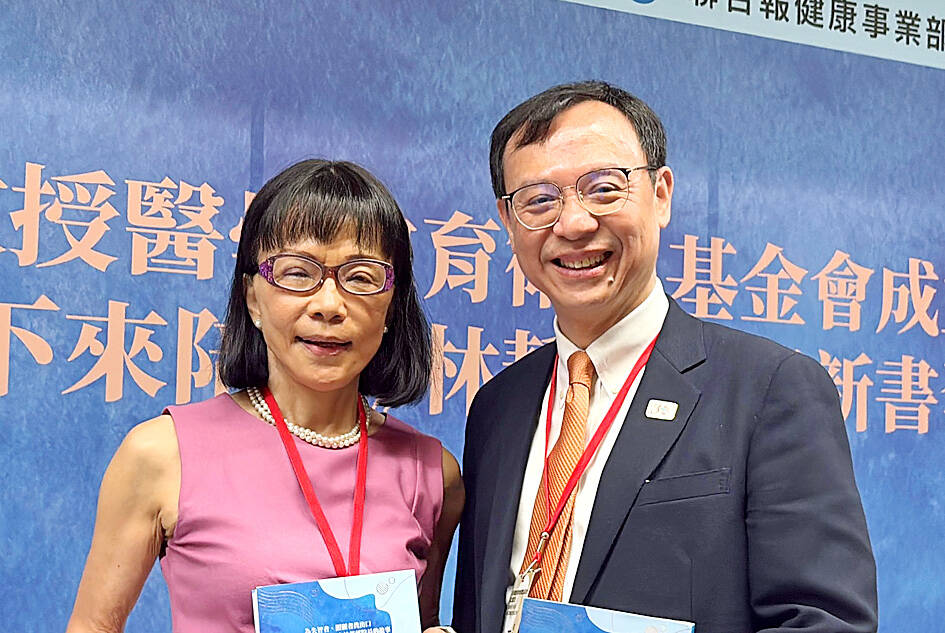One of two newly approved drugs for Alzheimer’s disease has been submitted for National Health Insurance (NHI) coverage, and it might be discussed by the end of the year, National Health Insurance Administration (NHIA) Director-General Shih Chung-liang (石崇良) said yesterday.
Shih made the remark at a book launch in Taipei, where author Lin Ching-yun (林靜芸), a celebrity cosmetic surgeon, introduced her new book on caring for her husband, Lin Fang-yue (林芳郁), former Minister of Health and former superintendent of three medical centers, who developed dementia five years ago.
The establishment of the Professor Lin Fang-yue Medical Education and Health Foundation was also announced at the news conference.

Photo: Lin Chih-yi, Taipei Times
Shih, who was a student of Lin Fang-yue, attended the event and was asked by reporters about the new Alzheimer’s disease drugs.
Last week, the Far Eastern Memorial Hospital in New Taipei City announced that one of the newly approved Alzheimer’s drugs, Kisunla, the brand name of the monoclonal antibody donanemab, developed by US pharmaceutical company Eli Lilly and Co, would be administered for the first time in Taiwan today.
Shih said that there are currently two FDA-approved drugs for Alzheimer’s treatment in Taiwan, with one having already applied for NHI coverage.
The other drug is Leqembi, the brand name of lecanemab, a monoclonal antibody medication developed jointly by Japanese pharmaceutical company Eisai and US pharmaceutical company Biogen.
Kisunla and Leqembi have demonstrated the ability to slow cognitive decline in people with early-stage Alzheimer’s.
Kisunla is undergoing a health technology assessment (HTA), Shih said, adding that it typically takes at least 45 days to complete, depending on the completeness of the data provided by the pharmaceutical company.
For the drug to be included in NHI coverage, it must first pass the HTA, then undergo specialists’ reviews, before the Pharmaceutical Benefit and Reimbursement Scheme Joint Committee makes a final decision, which could take at least six months, Shih said.
Asked if Kisunla might be included in NHI coverage by the end of the year, Shih said that it was possible that discussions could begin before the year ends, but since Leqembi is also expected to apply for NHI coverage, both drugs might be discussed together.
Asked for confirmation, Shih said that the NHIA had only received an official application for Kisunla, but reportedly, Leqembi intends to apply as well, so there is no fixed timeline for when they would be included.

SHIPS, TRAINS AND AUTOMOBILES: The ministry has announced changes to varied transportation industries taking effect soon, with a number of effects for passengers Beginning next month, the post office is canceling signature upon delivery and written inquiry services for international registered small packets in accordance with the new policy of the Universal Postal Union, the Ministry of Transportation and Communications said yesterday. The new policy does not apply to packets that are to be delivered to China, the ministry said. Senders of international registered small packets would receive a NT$10 rebate on postage if the packets are sent from Jan. 1 to March 31, it added. The ministry said that three other policies are also scheduled to take effect next month. International cruise ship operators

NUMBERS IMBALANCE: More than 4 million Taiwanese have visited China this year, while only about half a million Chinese have visited here Beijing has yet to respond to Taiwan’s requests for negotiation over matters related to the recovery of cross-strait tourism, the Tourism Administration said yesterday. Taiwan’s tourism authority issued the statement after Chinese-language daily the China Times reported yesterday that the government’s policy of banning group tours to China does not stop Taiwanese from visiting the country. As of October, more than 4.2 million had traveled to China this year, exceeding last year. Beijing estimated the number of Taiwanese tourists in China could reach 4.5 million this year. By contrast, only 500,000 Chinese tourists are expected in Taiwan, the report said. The report

HORROR STORIES: One victim recounted not realizing they had been stabbed and seeing people bleeding, while another recalled breaking down in tears after fleeing A man on Friday died after he tried to fight the knife-wielding suspect who went on a stabbing spree near two of Taipei’s busiest metro stations, Taipei Mayor Chiang Wan-an (蔣萬安) said. The 57-year-old man, identified by his family name, Yu (余), encountered the suspect at Exit M7 of Taipei Main Station and immediately tried to stop him, but was fatally wounded and later died, Chiang said, calling the incident “heartbreaking.” Yu’s family would receive at least NT$5 million (US$158,584) in compensation through the Taipei Rapid Transit Corp’s (TRTC) insurance coverage, he said after convening an emergency security response meeting yesterday morning. National

The Forestry and Nature Conservation Agency yesterday launched a gift box to market honey “certified by a Formosan black bear” in appreciation of a beekeeper’s amicable interaction with a honey-thieving bear. Beekeeper Chih Ming-chen (池明鎮) in January inspected his bee farm in Hualien County’s Jhuosi Township (卓溪) and found that more than 20 beehives had been destroyed and many hives were eaten, with bear droppings and paw prints near the destroyed hives, the agency said. Chih returned to the farm to move the remaining beehives away that evening when he encountered a Formosan black bear only 20m away, the agency said. The bear